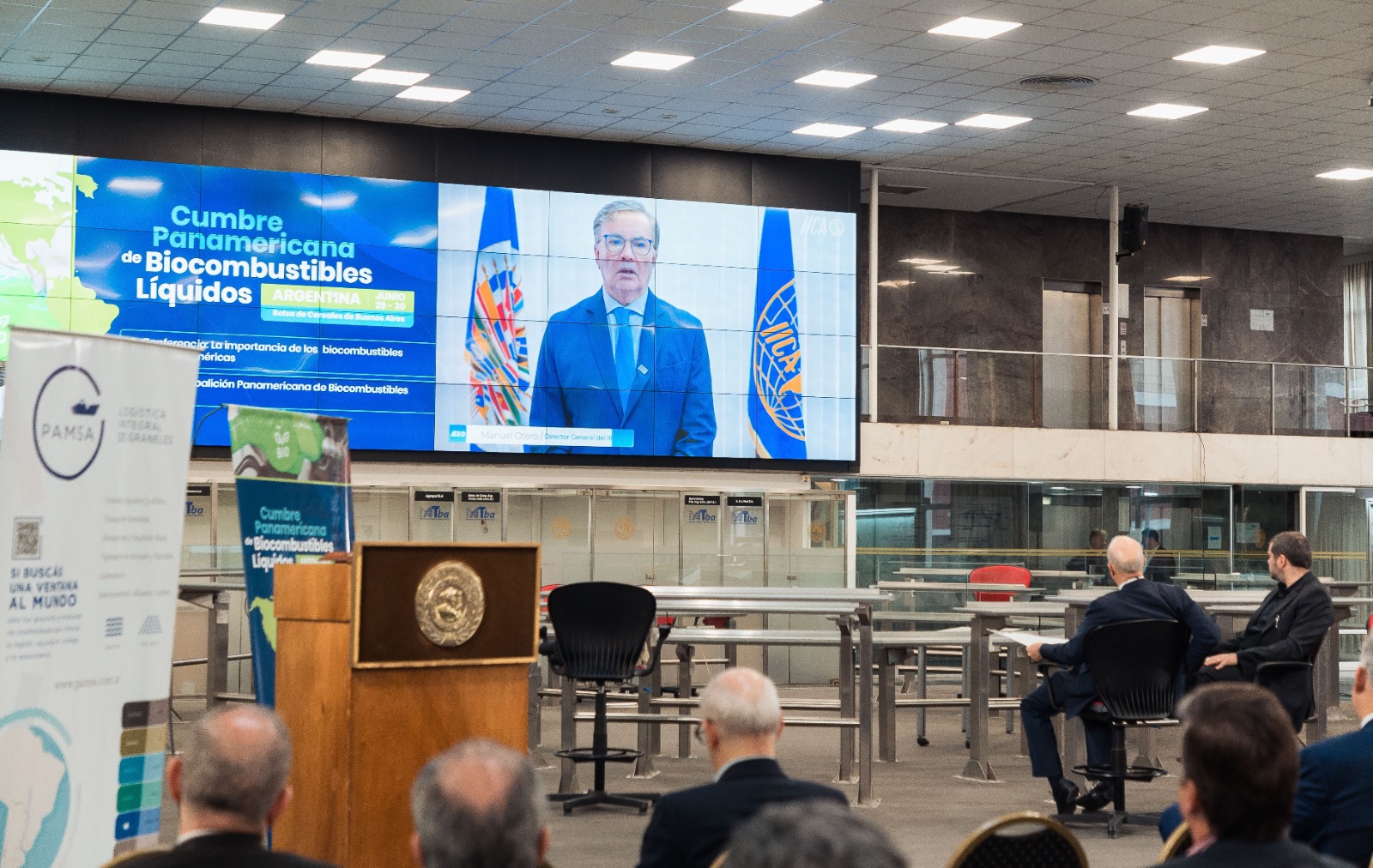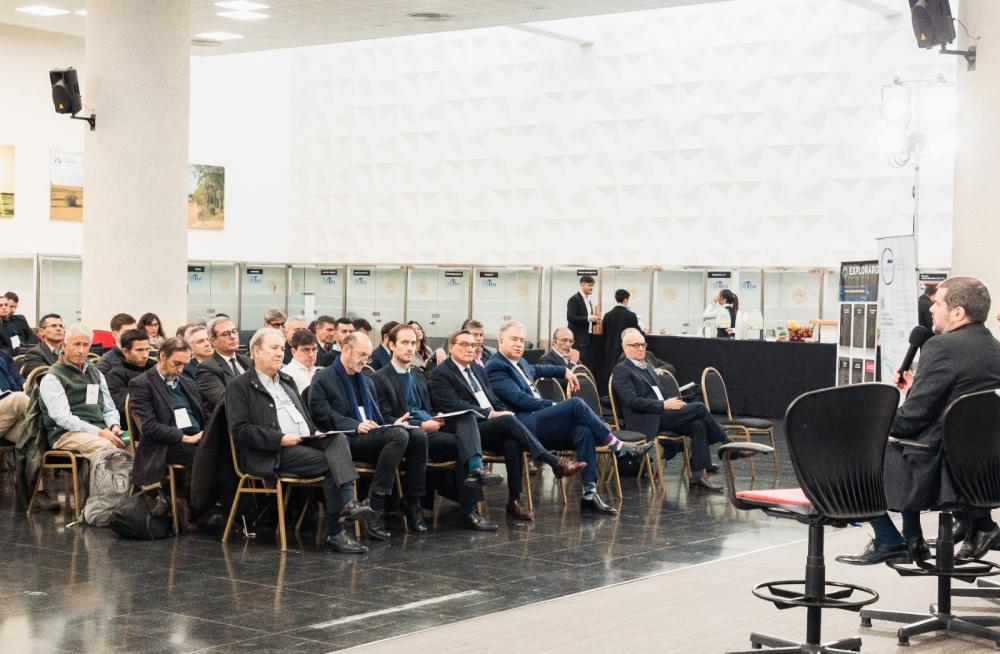The Pan-American Liquid Biofuels Summit, which took place on June 29 and 30 at the Buenos Aires Cereal Exchange, addressed the key role of biofuels in the region.

Buenos Aires, 3 July 2023 (IICA) – The Americas has immense potential and is in an ideal position to move forward in implementing modern public policies for the liquid biofuel sector, intensifying production and attracting investment, while also taking steps to bring about greater convergence, including in the area of sustainable aviation fuels”.
These were some of the conclusions of the Pan-American Liquid Biofuels Summit on June 29 and 30 at the Buenos Aires Cereal Exchange, which also hosted a conference and a closed meeting of the Pan-American Liquid Biofuels Coalition (CPBIO in Spanish).
The high-level meeting provided a forum to share information and discuss the key role of biofuels in the region, in addition to the numerous opportunities for development in the Americas, in terms of both ground and air transportation, within the context of the global energy transition that is now underway.
The Summit was organized by the Pan-American Liquid Biofuels Coalition (CPBIO), which is made up of the main business and industrial associations in the Americas involved in the production of sugar, alcohol, corn, sorghum, soybeans, vegetable oil and cereals, among other agricultural products.
The coalition of 25 organizations was founded in March during a meeting at the Headquarters of the Inter-American Institute for Cooperation on Agriculture (IICA) in San Jose, Costa Rica. Its aim is to coordinate the sustainable production, promotion and consumption of these clean energy sources throughout the Hemisphere. IICA is the CPBIO’s Technical Secretariat.
The Buenos Aires meeting brought together eminent authorities, analysts, producers and professionals from the Americas and Europe. The discussions included an analysis of successful policies on liquid biofuel use to decarbonize the transportation sector.
Speaking at the event, IICA Director General, Manuel Otero, remarked that, “Biofuels are a key element of the transition to clean energy, requiring less time for development, lower costs and greater ease of implementation, when compared to electromobility and hydrogen propulsion. Therefore, these fuels represent a fossil fuel alternative that is immediately available, economically feasible and environmentally sustainable”.
Moreover, he stressed that, “We must exploit the comparative advantage of the Americas to continue developing biofuels. The region has a wealth of biomass with immense potential to be sustainably processed to produce these fuels. However, above all, public policies will play a critical role in their development”.
Patrick Addam, Executive Director of the Corn Bioethanol Chamber, maintained that, “The conference has brought three issues into sharp focus: the enormous potential of the region to expand biofuel production; the need for modern regulatory frameworks that facilitate private investment in projects; and the enormous opportunity that we have to set out on a path of regional convergence, including with respect to sustainable aviation fuels”.
The event also discussed experiences in widescale biodiesel and bioethanol use in various countries in the Hemisphere and Europe, while also highlighting relevant instances in which biofuels are entering the carbon credit trading market (RenovaBio Brasil).
Flavio Castellari, Executive Director of Brazil’s Local Alcohol Productive Arrangement (APLA), pointed out that, “RenovaBio is a Brazilian public policy that was created to recognize the decarbonization capacity of biofuels and to promote the energy-environmental efficiency of production units. Since it was introduced a little more than five years ago, it has issued almost 100 million decarbonization credits (CBIOs), which is equivalent to 100 million tons of carbon. We hope that other countries will follow this good example and establish their own RenovaBio”.
On the other hand, the meeting analyzed new trends in emerging biofuels. For example, it highlighted the significant upsurge in the use of green diesel or hydrotreated vegetable oils (HVOs).
For example, Victor Castro, Executive Director of the Argentine Biofuel Chamber (CARBIO), explained that, “Green diesel or hydrotreated vegetable oils (HVOs) could account for as much as 25% of all biodiesel produced in 2023”.
The discussions also stressed the immense potential of sustainable aviation fuels, especially those manufactured from biological raw materials.
Agustín Torroba, International Biofuel Specialist at IICA stressed that, “The Americas could become an export platform for sustainable aviation fuel, by tapping its vast supply of raw materials with the potential to be industrialized, bearing in mind also that the international civil aviation industry has committed to a net zero emission target by 2050. Approximately 65% of greenhouse gas emission reduction will be as a result of sustainable aviation fuels”.
President of the Argentine Sugar Center, Jorge Feijóo, commented that, “There are three key elements worth noting in this first conference of the Coalition: the important points raised by the presenters in relation to the effective contribution of liquid biofuels to greenhouse gas emission reduction—in terms of quantity, opportunity and ease of implementation—; the highly qualified audience that attended the meeting and the camaraderie displayed among members of the Coalition participating in person and virtually in the second working session, in which we discussed various issues with respect to its organization and implementation”.
For many countries that are just beginning to implement regulatory frameworks for biofuels, the CPBIO events proved extremely useful. Thus, Aída Lorenzo, Manager of Guatemala’s Renewable Fuels Association, admitted that, “Undoubtedly, learning from others who have experience in developing and implementing biofuel programs in their countries is extremely helpful for Guatemala. We are grateful for the support of the Coalition in enabling us to learn from other participating countries and institutions”.
In closing, Patrick Addam reflected that, “The meeting of the Coalition allowed us to make concrete headway in the biofuel agenda, bolstering individual efforts to promote and develop biofuels. The Coalition is the tool we needed to improve communication, share experiences and demonstrate the environmental, social and economic benefits at various international forums”.

What is the CPBIO?
The Pan-American Liquid Biofuels Coalition (CPBIO) is made up of the major business and industrial associations of the Americas involved in the production and processing of sugar, alcohol, corn, sorghum, soybeans, vegetable oil and cereals, among other agricultural products.
The 25 organizations that founded the CPBIO and that represent many countries of the Americas, signed a declaration in March, calling for a more robust institutional framework and greater coordination to promote biofuels.
Among other issues, they pointed out that, “The climate crisis is a matter of increasing concern, but we still have time to prevent greater catastrophes, as biofuels, and liquid biofuels in particular, could play a key role in decarbonizing transportation”.
The CPBIO stressed that biofuels improve air quality and the health of the population, as well as contribute to agricultural and economic development. Their production diversifies product choice, adds value, protects soils through crop rotation, creates sustainable jobs and guarantees a stable demand over time for farmers.
Biofuel production also reduces the vulnerability associated with a single energy source, instead of depending solely on fossil fuels, for example. The CPBIO is made up of the following organizations:
- Sugar Association of El Salvador
- Renewable Fuels Association of Guatemala (ACR)
- Argentine Soybean Chain Association (ACSOJA)
- Sugar Producers of the Central American Isthmus (AICA)
- Alcohols of Uruguay (ALUR)
- Association of Alcohol Producers of Guatemala (APAG)
- Local Alcohol Productive Arrangement (APLA) of Brazil
- Association of Biofuel Producers of Brazil (APROBIO)
- Sugar and Alcohol Association of Panama (AZUCALPA)
- Paraguayan Chamber of Biofuels and Renewable Energies (BIOCAP)
- Argentine Sugar Center (CAA)
- Paraguayan Sugar and Alcohol Center (CAAP)
- Corn Bioethanol Chamber (BIOMAIZ) of Argentina
- Argentine Biofuel Chamber (CARBIO)
- Oil Industry Chamber of Argentina-Cereal Exporters Center (CIARA-CEC)
- National Chamber of the Sugar and Alcohol Industry (CNIAA) of Mexico
- National Committee of Sugar Producers of Nicaragua (CNPA)
- National Federation of Biofuels of Colombia (FEDECOMBUSTIBLES)
- Sugar Cane Industry Association (LAICA) of Costa Rica
- Argentine Corn and Sorghum Association (MAIZAR)
- Peruvian Association of Agro-industrial Companies of Sugar and Related Products (PERUCAÑA)
- Association of Latin American Sugar Producers (UNALA)
- National Corn Ethanol Union (UNEM)
- Brazilian Sugarcane Industry Association (UNICA)
- U.S. Grains Council
More information:
Institutional Communication Division.
comunicacion.institucional@iica.int











